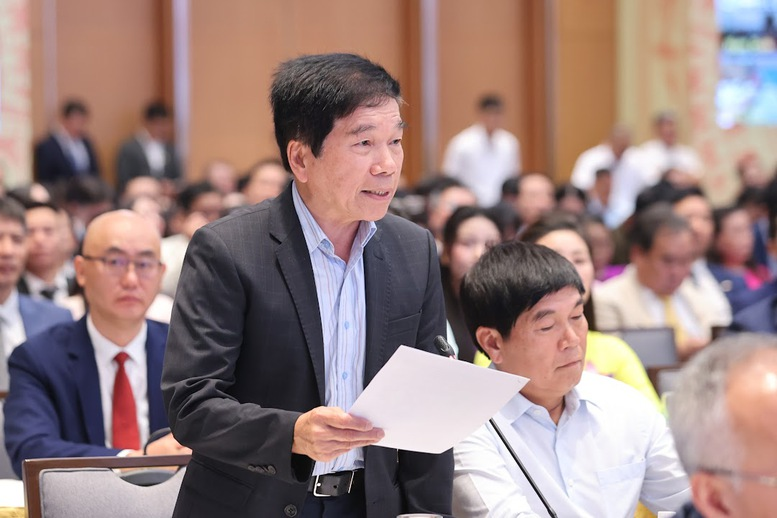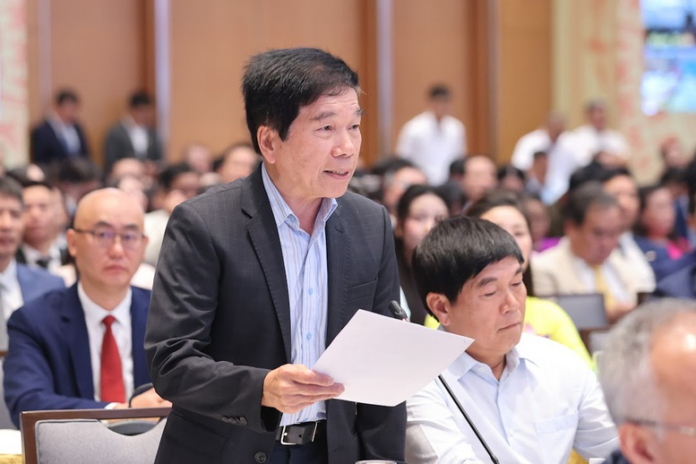Completing the National Land Database by 2025
At a recent discussion between the Prime Minister and the business community, the Ministry of Finance proposed several solutions to realize Resolution 68 of the Politburo on private economic development. These solutions address land-related issues, a long-standing bottleneck, to facilitate easier access for private enterprises.
The Ministry of Finance announced that by 2025, the National Land Database will be completed, a pivotal step in digitizing land management and transparency of ownership information.
Along with this, the implementation of electronic transactions in land-related matters and a reduction in the time taken to process land lease procedures and issue land-use certificates will minimize bottlenecks that often cause delays, increased costs, or lost business opportunities for private enterprise projects.
Notably, each industrial zone or cluster will allocate a minimum of 20 hectares or 5% of the total land area with infrastructure for high-tech enterprises, small and medium-sized enterprises, and creative start-ups; offering a minimum 30% reduction in land rent for the first five years of operation, and deploying supportive policies for enterprises renting houses and land that are public assets.
Digitizing Essential Procedures
At the discussion, Mr. Nguyen Quoc Hiep, Chairman of the Vietnam Contractors Association, emphasized that Resolutions 66 and 68 of the Politburo are the “golden key” to helping businesses overcome barriers and marking a revolution in the perception of the private sector’s role. However, transforming this perception into action requires a synchronized effort from the entire government system.

Mr. Nguyen Quoc Hiep, Chairman of the Vietnam Contractors Association
|
Mr. Hiep pointed out that inspections and oversight are significant hurdles for real estate businesses. Although Resolution 68 stipulates that inspections should occur only once a year if necessary, there is currently no coordinating agency. Many businesses simultaneously host multiple inspection teams from tax, land management, construction, planning, and fire prevention departments, resulting in time and cost inefficiencies. Therefore, Mr. Hiep suggested the need for a clear coordinating entity.
Additionally, while there have been positive changes in the institutional and legal system with the 2024 Land Law, the 2023 Housing Law, and the 2023 Real Estate Business Law, some guiding decrees have not kept pace with reality. For instance, Decree 103 on land use charge collection has several shortcomings, causing financial passivity for enterprises due to their exclusion from land price appraisal processes, coupled with the requirement to pay additional charges if the appraisal is delayed. Mr. Hiep recommended that legal documents be drafted more meticulously, incorporating expert opinions and feedback from businesses directly impacted by these regulations.
According to Mr. Hiep, Resolution 68 emphasizes that enterprises are to be served rather than managed, but there are still significant gaps in perception. “A project was delayed for seven months due to circular processes between ministries, awaiting unclear procedures and paperwork,” he shared. Mr. Hiep suggested that localities meet with enterprises every six months to review and streamline procedures.
On administrative reform, he stressed the need to substantially reduce investment and licensing procedures. For procedures that cannot be eliminated, there should be a digitized process, clear timelines for handling, and designated responsible units. Specifically, for the real estate sector, a unified agency should provide simplified investment procedure guidance.
A District Chairman in Binh Thuan Province has been suspended from work.
Mr. Bui Ngoc Lam, Chairman of the People’s Committee of Mui Ne Ward, Phan Thiet City, Binh Thuan Province, has been suspended from his position for 15 days to facilitate an investigation into his responsibilities in land and construction management in the area.
The Magic of Words: Transforming a Title with Creative Flair
“Unveiling the Vision: The Mayor of Can Tho Directs the Implementation of the Government Inspectorate’s Conclusion.”
The Can Tho authorities will reclaim over VND 463 billion to the budget and make deductions of more than VND 2.5 billion upon project settlement. They will also urge seven investors to pay over VND 193 billion in delayed commitment fees and address instances of improper refunds as per the conclusions of the Government Inspectorate.
Unveiling Corruption: Government Inspectorate Exposes Land Management Violations in Can Tho
The Government Inspectorate has revealed that the former Department of Natural Resources and Environment of Can Tho issued thousands of land-use certificates for project development, which were not in accordance with the Land Law. Similarly, irregularities were found in the land leasing process for industrial zones.





















